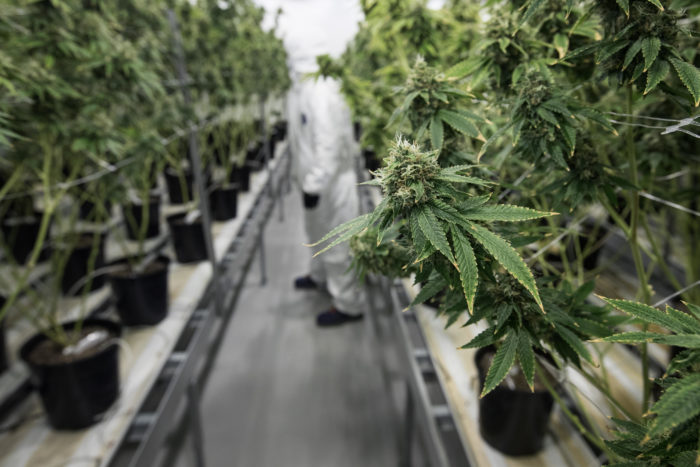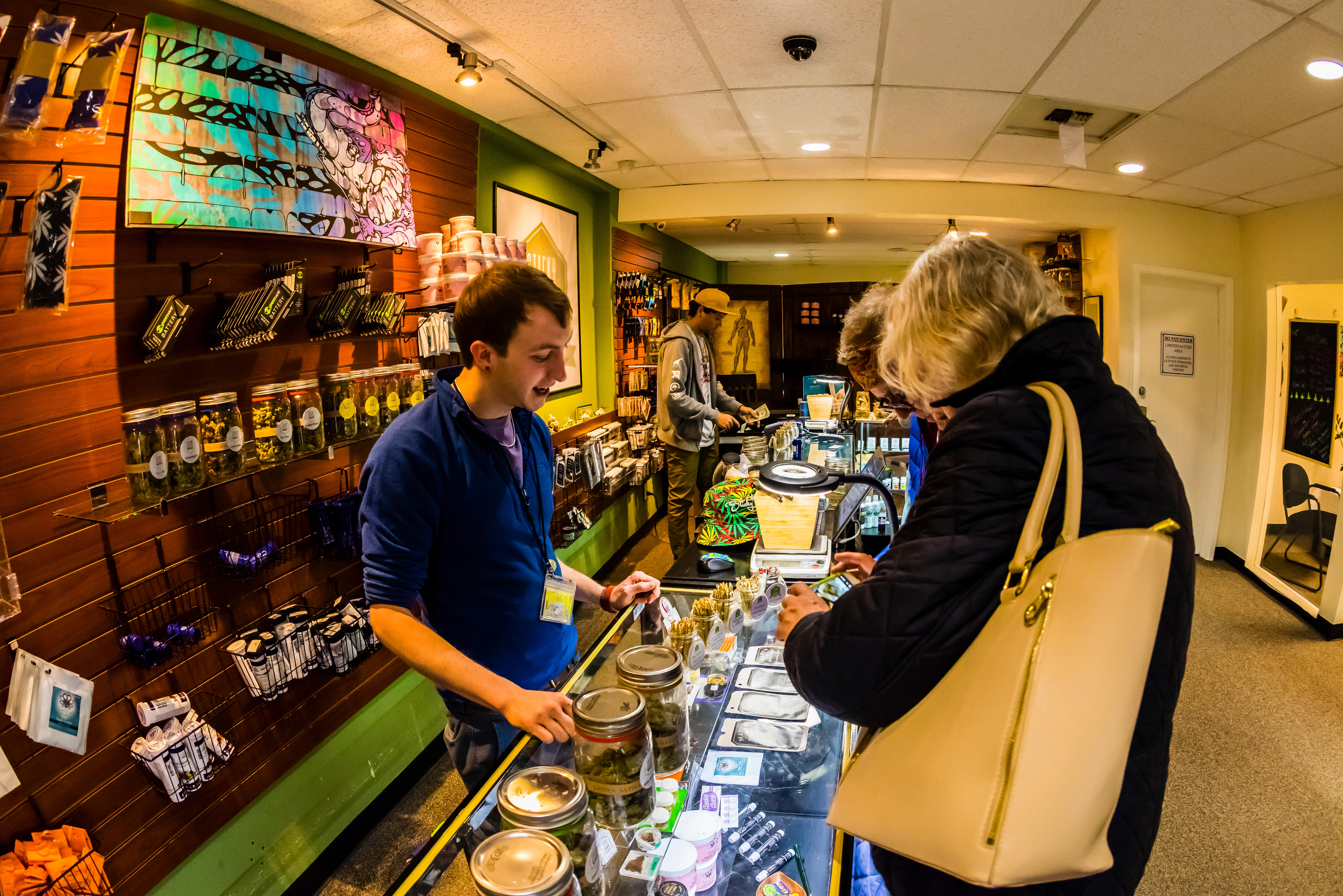Medical Pot Is Coming to Brooklyn. This Could Be Big
The state approves two marijuana dispensaries, part of an industry expected to reach $50 billion within a decade
An employee looks over medical-marijuana buds at a growing facility in Ontario (Photo by Lars Hagberg/Alamy Stock Photo)
The medical-marijuana industry is about to open up shop in Brooklyn. Two of them, in fact. And it promises to be a big business. Last week, when the cannabis-industry investors at iAnthus Capital announced their $17.3 million acquisition of the pot-dispensing company Valley Agriceuticals, they pointed hungrily to the Brooklyn marketplace. “With the dispensary location in Brooklyn, Valley Agriceuticals will have a presence in the second most densely populated county in the United States,” iAnthus declared.
Besides approving the corporate purchase last week, the New York State Department of Health approved five more companies to manufacture and dispense medical marijuana, two of which plan to operate the coming dispensaries in Brooklyn: Valley, which is based in Purchase, NY, and Citiva, based in Manhattan. The Brooklyn dispensaries are expected to open in early 2018, though the sites have not yet been named. New York City currently has just four dispensaries: two in Manhattan and one each in the Bronx and Queens.

Norwegian tourists visiting the Sticky Buds Broadway marijuana dispensary in Denver (Photo by Blaine Harrington III/Alamy Stock Photo)
New York State is a bit late to the party in fostering the blooming legal-cannabis business, which reached an estimated $7.2 billion last year and is expected to be worth $50 billion within a decade. Medical marijuana has been approved in more than half of the states (28), while eight states plus the District of Columbia have legalized pot for recreational use.
New York approved medical pot in 2014 and as of last week, had more than 26,000 users with prescriptions. “There are so many New Yorkers whose ailments are better treated by medical marijuana compared to traditional prescription drugs. Having a dispensary here in Brooklyn will be beneficial in terms of access for those who need it,” city councilman Stephen Levin told The Bridge. “You hear horror stories of parents traveling across state lines, sometimes moving permanently, to get special medication for their children. When something like that happens we’ve really gone too far,” said Levin, whose district stretches from Boerum Hill to Greenpoint.
Marijuana Goes Main Street
The major investments in medical marijuana are emblematic of the mainstreaming of a business that has enormous economic potential, judging by the scale of what’s still underground: an estimated $46 billion in illegal sales last year. By contrast, the legal-industry’s emerging pioneers are far from stoners. The co-founder of iAnthus Capital, for example, is a Stanford MBA with experience at Bank of America and Goldman Sachs; his co-founder is a tech-industry veteran with a law degree from Rutgers.
Valley Agriceuticals has a leadership team including financial veterans, medical professionals and pot-growing botanists. The company plans to manufacture its products at a facility in Walkill, NY, with advice from a partner firm, Seach, one of the largest medical-marijuana farmers in Israel. The company will sell its products through a retail brand called Origin Health Centers, complete with patient-friendly touches like “Nurse Eileen,” more formally known as Eileen Konieczny, the company’s director of patient services and president of the American Cannabis Nurses Association.
Citiva, the other company approved to open a shop in Brooklyn, was started in 2015 by a group of health-care professionals. The CEO and co-founder, Kim Volman, is a registered pharmacist. The company is building a research-and-development hub at the University of the West Indies in Kingston, Jamaica, where it plans to carry out clinical trials.
https://www.youtube.com/watch?v=tmFvmn2nGpA&feature=youtu.be
Citiva CEO Kim Volman talks about pot's medical benefits on Jamaican TV (Video by SmileTV via Citiva)
Cannabis-based products have been prescribed for a range of diseases that include arthritis, asthma, cancer, chronic pain, epilepsy, glaucoma, multiple sclerosis and post-traumatic stress. Most of the evidence for pot’s medicinal effects has been anecdotal, however, because federal law (which still prohibits pot) also suppressed research into its benefits. As a result, many doctors have been reluctant to embrace it, according to Marijuana Business Daily. As of last week, New York State had 1,146 practitioners who had prescribed pot; the state has nearly 97,000 physicians.
Research Starts to Back It Up
With pot’s growing legalization, that’s changing. In a recent first, scientists showed that a marijuana component can help some patients with epilepsy. “We now have solid, rigorous scientific evidence that in this specific syndrome, cannabidiol is effective at reducing seizures,” said Dr. Orrin Devinsky, a neurologist at NYU Langone Medical Center and an author of the new study, quoted in STAT. Since New York State added pain to the list of approved conditions for pot prescriptions, the number of certified patients has increased 72%, the state said.
Even so, one limiting factor for the industry is New York State’s restrictions on how pot can be legally consumed. The state allows only liquids and oil for use with vaporizers or inhalers, as well as oral capsules. Edibles and weed for smoking are not allowed at this point.
Councilman Levin, for his part, thinks New York’s law should be further liberalized. Levin has sponsored a city council resolution calling for pot’s legalization and taxation. “At this point, we’ve seen it work in other states. They’ve experienced less drug utilization among minors, not more. These other states have seen legalization lead to many benefits,” he said. “Tax revenues from legalization fund education and public-health initiatives, it spurs the local economy, and it frees up tremendous law-enforcement and criminal-justice resources to fight violent crime.”
Levin believes it could help with the country’s opiod-abuse epidemic as well. “Giving doctors an alternative to prescribing opioids, for example, is one of many ways to address the heroin epidemic that’s destroying communities.”













